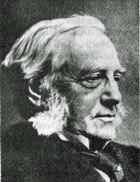About
1823-1900
Max Mueller is one of the best-known Indologists, partly because of his successful efforts to address the general public. He repeatedly drew attention to the uniqueness of the Veda and awakened interest in Indology among educated people. What he claimed to be the object and aim of philology was certainly his own aim too, "to learn what man is, by learning what man has been."
Friedrich Max Mueller was born on 6.12.1823 in Dessau. His father, Wilhelm Mueller (1794-1827), was a librarian, whose lyrics were well known at the time. Max Mueller studied classical philology and philosophy at Leipzig University and was induced by Hermann Brockhaus to learn Sanskrit. In 1844, he went to Berlin in order to study with Bopp and Schelling. A year later, he went to Paris, where he attended E. Burnouf's classes on the Rigveda. "A new world was opened up to me", Mueller wrote in his autobiography. He decided to publish the Rigveda together with Sayana's commentary. In 1846, Max Mueller went to London, where the East India Company agreed to bear the expenses of printing this work. The first volume was published in 1849 when Mueller was only 26 years of age. Other volumes followed in 1854,1856,1862 and 1874. The first edition of 500 copies was sold very quickly and the Maharaja of Vijayanagara agreed to bear the expenses of the second edition. Four volumes of Rigveda Samhita, the Sacred Hymns of the Brahmans, together with the commentary of Sayanacharya, were published in London under the patronage of the Maharaja of Vijayanagara, Sir Pasupati Anand Gajapati Ray. Several editions of the Rigveda in the Bombay Sanskrit Series were based on this work. Max Mueller translated Hymns to the Maruts or storm-gods in the first volume of the Rigveda translation; the translation, however, was not continued.
